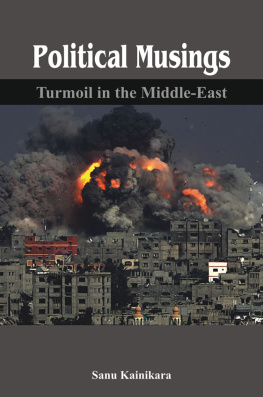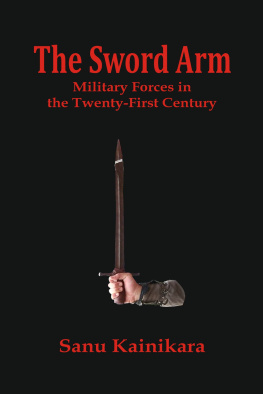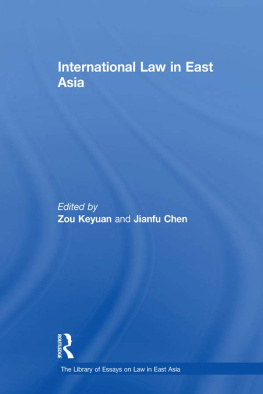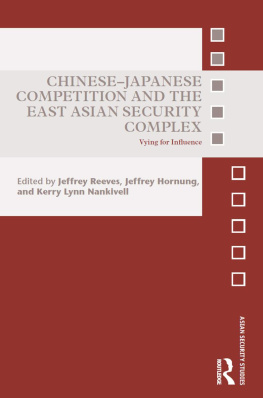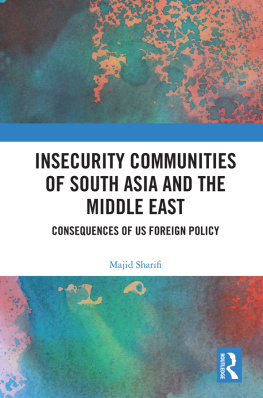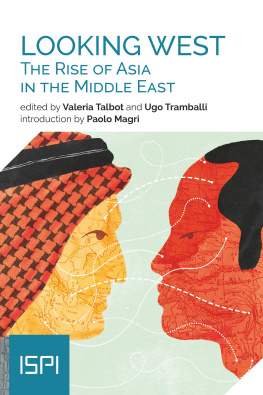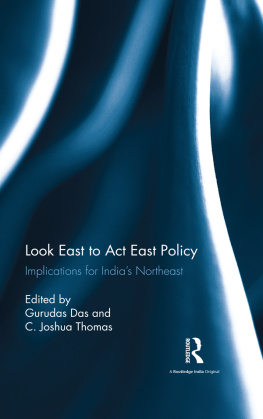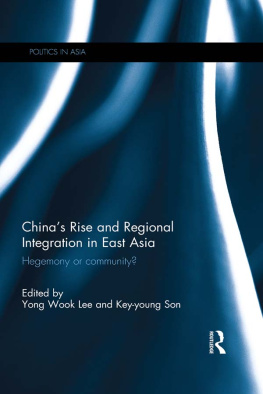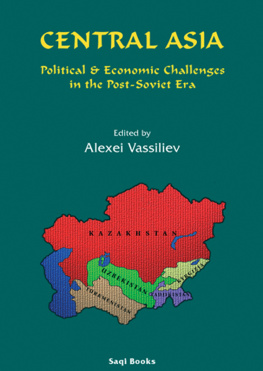Political Musings
Political Musings
Turmoil in the Middle East
Sanu Kainikara
Vij Books India Pvt Ltd New Delhi (India)
Copyright 2016, Sanu Kainikara
Dr Sanu Kainikara
416, The Ambassador Apartments
2 Grose Street
Deakin, ACT 2600, Australia
First Published in 2016
ISBN : 978-93-85563-53-9 (Hardback)
ISBN : 978-93-85563-54-6 (ebook)
Designed and Setting by
Vij Books India Pvt Ltd
2/19, Ansari Road, Darya Ganj, New Delhi - 110002 (India)
www.vijbooks.com
All rights reserved.
No part of this book may be reproduced, stored in a retrieval system, transmitted or utilized in any form or by any means, electronic, mechanical, photocopying, recording or otherwise, without the prior permission of the copyright owner. Application for such permission should be addressed to the author.
Dedicated to the memory of
Tara Lola Menon (1949-2015)
Sister and Friendsorely missed
Whose Joie de Vivre remains unmatched!
BOOKS BY THE SAME AUTHOR
Papers on Air Power
Pathways to Victory
Red Air: Politics in Russian Air Power
Australian Security in the Asian Century
A Fresh Look at Air Power Doctrine
Friends in High Places
Seven Perennial Challenges to Air Forces
The Art of Air Power: Sun Tzu Revisited
At the Critical Juncture
Essays on Air Power
The Bolt from the Blue
The Asian Crucible
The Indian History Series: From Indus to Independence
Volume I: Prehistory to the Fall of the Mauryas
Volume II: The Classical Age
Volume III: The Disintegration of Empires
AUTHORS PREFACE
T his book is a collection of essays that were written between January and December 2015, as commentaries and analysis of on-going events, with a marked focus on the Middle-East. Without doubt, the Middle-East was in the spotlight for the entire world throughout 2015, with the conflict in Syria continuing to rage and the fight against the Islamic State (IS) not abating even a little bit. The happenings in both Syria and Iraq reverberated across Europe and also some parts of Asia and it can be said with absolute certainty that there was no nation in the world that was not influenced in some way or the other by the conflict. The rushing currents of change emanating from the Middle-East touched the entire international community.
Commenting on a contemporary event can be considered the first draft of history, although it is also a fact that such initial analyses may not serve any overarching purpose in some cases, especially if the analysis proves to be incorrect into the near-term future. Writing about the here and now involves a certain amount of imagination, which could be either right or wrong, and is almost completely dependent on the individual ethos of the analyst. This is the case with the essays collected in this book, the analysis and their veracity, or lack thereof, is a function purely of my own intuitions and understanding of the situation as it was developing.
A majority of the essays in the book have been published by the Eurasia Review over the year and I have received both brickbats and bouquets for my analysis from a range of people, indicating the wide interest that the progress of events in the Middle-East, and to a lesser extent South Asia, elicit. This book is the first of what I hope will be a series of collection of political essays marking the passage of each year. They would, over a period of time, form yearbooks to mark the significant events of the 12-month period while also providing an analysis as they were understood at the time. I sincerely hope that these yearbooks will gradually grow into reference material for future analysts and scholars to study the events to which I bear remote witness. As a student of international politics, nothing would delight me more.
Sanu Kainikara
Canberra
February 2016
All men and women are to each other
The limbs of a single body, each of us drawn
From lifes shimmering essence. Gods perfect pearl;
And when this life we share wounds one of us,
All share the hurt as if it were our own,
You, who will not feel anothers pain,
You forfeit the right to be called human.
Poem Bani Adam in Gulistan,
Saadi Shirazi (1210-1292), Renowned Persian Poet
Translated by Richard Jeffrey Newman,
Selections from Saadis Gulistan
Recognising an existing regime should not be regarded as implying approval. It should be regarded merely as acknowledgement of existing facts. The West, in the end, came to admit this as regards the USSR, but it did not learn from this experience the unwisdom of tardiness in acknowledging regimes which cannot be upset without world war.
Bertrand Russell,
Has Man A Future, published 1961, p. 119
INTRODUCTION
2015 THE YEAR THAT WAS
T he common point of discussion throughout 2015 was the on-going and bloody Syrian Civil War and the conflict between the international coalition and the Islamic State (IS) mainly in Iraq and Syria. The Civil War does not seem have any logical conclusion and the fight against the IS, by some of the most powerful military forces in the world, does not seem to be making any visible progress. The reasons for this state of affairs are many and defies any comprehensive listing, since most of them overlap and some of them are contradictory. The conflict in the heart of the Middle-East also spawned a number of subsidiary actions that made temporary splashes in the collective conscious of the free world and died along with its ripples.
Saudi Arabia and the Yemeni Adventure
The year started with an outwardly seamless change in the leadership in Saudi Arabia, in a display of predestined, calculated and rapid transition of power from the old to the new guard, on the death of King Abdullah. For the first time in the history of the desert kingdom a grandson of Abdul-Aziz al-Saud, the founder of the al-Saud dynasty, was elevated to the ruling elite as the Deputy Crown Prince, the de facto second in line for succession. King Salman, the new king, has made a visible effort to consolidate the power of the Sudairi Seven, brothers born to Hasa bint Ahmed al-Sudairi, and their progeny, much to the chagrin of a large number of other royalty who feel sidelined from the core of power. However, tribal loyalty xiv has been an indelible and critical part of the smooth transition of power in Saudi Arabia and this time has been no exception.
King Salman inherits a foreign policy that is in tatters. For the past two decades, Saudi Arabia under King Abdullah had made a series of foreign policy blunders that culminated with the kingdoms vehement opposition to the Arab Spring that started in 2011. Then there was the still on-going estrangement with the US, their primary guarantor of security. The US reaction to the Arab Spring was more of an eye opener for Saudi Arabian policy makers, than was the unexpected rapidity with which the phenomenon spread across the region. This started an internal analysis within the ruling cabal regarding the future security of the nation and the reliance that could be placed on the US. The seed of doubt regarding assured US support was one of the reasons for the Saudi Arabian leadership opting for a far more proactive and forceful foreign policy throughout 2015, rather than continuing the traditional soft approach and reliance on the economic might of the kingdom.

